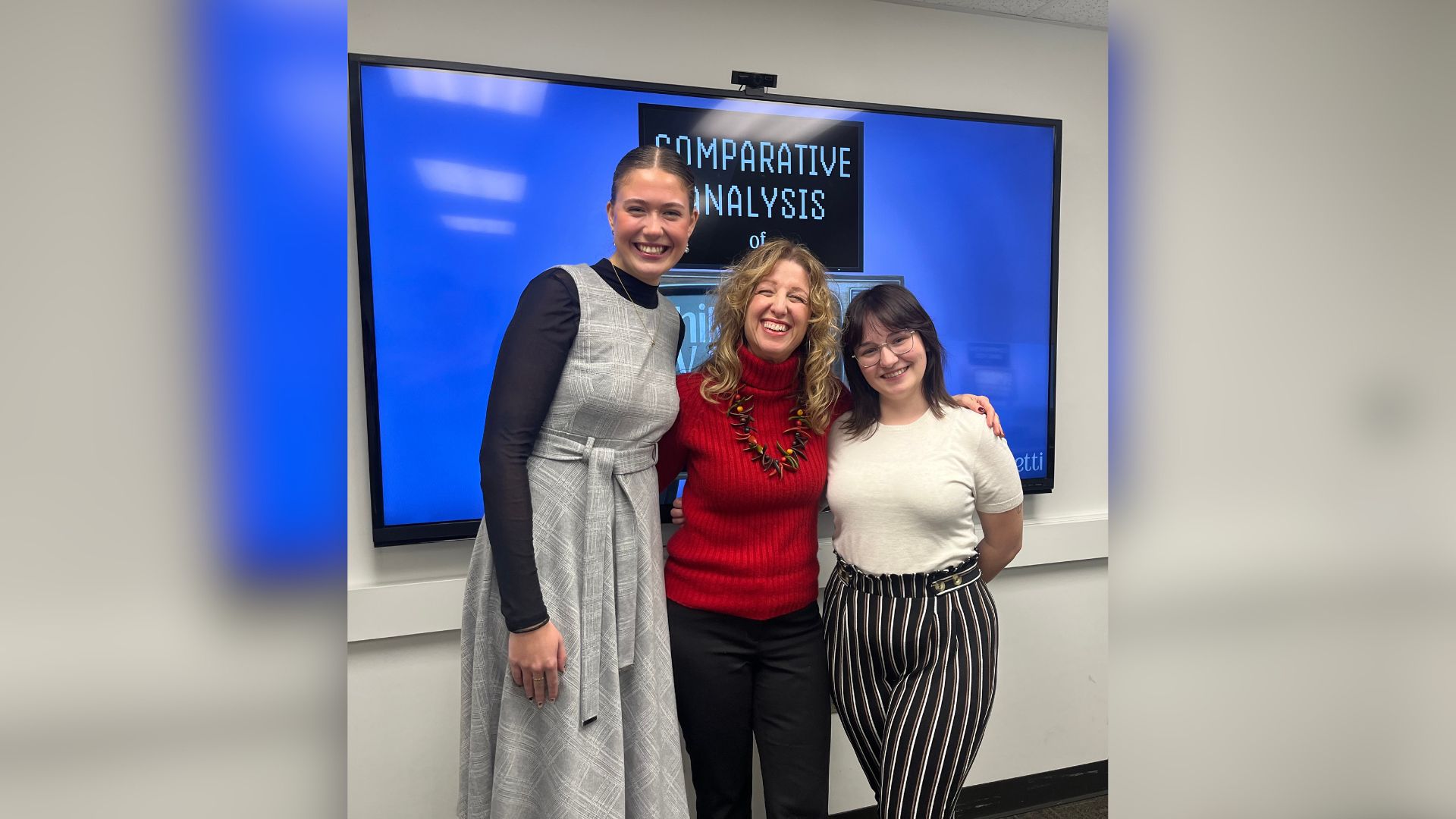At the conclusion of the winter 2024 semester, media studies and production majors Reilly Ennals, KLN ‘24, and Vivian Allegretti, KLN ‘24, became the first two Klein College students to complete the children’s media certification. They presented their capstone projects in front of a panel of students, professors and industry experts. Ennals created a show bible for PBS WHYY children’s show, Albie’s Elevator and Allegretti completed a comparative analysis of children’s television shows throughout the past 60 years.
In 2022, Ennals took the class Media and Children with Sherri Hope-Culver, the director of the children’s media certificate. It opened her mind up to what she wanted to do after graduation. She has always wanted to work with children in some way, and this class helped her focus on the type of media production she wants to go into.
“It’s just so different from the normal television industry,” said Ennals. “That’s what I want to do. I want to work in children’s television, it’s so much happier and fun.”
Allegretti was also naturally drawn to the children’s media certificate.
“I’ve always been interested in children’s media and making content for kids,” Allegretti said.
As society around us becomes more and more mediated, children have also become more online. In 2011, Common Sense Media found that two-thirds of infants to eight-year-olds in the United States watch television at least once a day. According to the National Center for Education Statistics, in 2021, 97% of children aged three to 18 years old in the US have access to the internet at home.
“It’s a little bit scary, how unrestricted their access to the internet is,” Ennals said. “Even with parental controls, they’re accessing way more media content than we could have ever imagined when we were younger.”
However, for Allegretti, the goal shouldn’t be to get kids off screens. Children can benefit from being exposed to media, but it must be done with their care in mind.
“Telling children they can’t be on screens is kind of counterintuitive, because technology is so embedded into our culture nowadays, and I feel like they really need to learn about it to progress in society, because it’s just going to keep getting bigger and bigger,” explained Allegretti. “But they need to learn about it in a healthy way that’s not messing with their brain.”
Media for children can be a huge asset. For example, research shows children who watch Sesame Street gain more early-learning skills than those who do not.
“Media targeted at a [two to five years] age group is so important because that’s really how they’re building their foundational skills of education and social learning,” said Allegretti. “For that age, it’s really important to create media that teaches them life skills and educational foundations, little curriculums so that they can understand what they’re getting into when they go into kindergarten.”
Despite the benefits of children’s media, our ever-changing world can make it hard for kids to access content that is good for them. For Ennals, now more than ever is the time to research children’s media.
“Things are just changing so rapidly that right now is a good time to focus on what is good quality content for children,” Ennals said. “How do we make it? How do we make sure kids have access to it?”
Ennals is currently an intern on the WHYY show Albie’s Elevator – a puppet show made for preschool aged children in Philadelphia. For her capstone project, Ennals developed a show bible for the production, as they did not already have one. This document has all of the elements that the producers and writers need to make the show, including character information, settings, curriculums and synopses to keep everything consistent. Now that she’s graduated, Ennals plans on continuing her work at the show and on her show bible, which the producers are currently using.
Allegretti, on the other hand, took a more analytical approach to her capstone, and researched the evolution of children’s television shows over the past 60 years. Taking two shows from every 20 years – 1960s, 1980s, 2000s and 2020s – she analyzed the curriculum content that was included in each program.
“I saw some progression over the years, like more social-emotional learning goals embedded into each show,” Allegretti said. “The shows of the 1960s were definitely not as progressive or good for children’s minds as the shows of today.”
Now that they’re all done, Ennals and Allegretti are thrilled to have completed the children’s media certificate. With the program still in its early stages, they are the first two students to receive this certificate.
“We’ve been bragging about it all,” joked Ennals. “It’s not just the first people; it’s like the first people ever to get a certificate in children’s media.”
Ennals and Allegretti are also excited to see the growth of the children’s media certificate and can’t wait to look back and see how far it has evolved.
“There’s already a pretty big group who are already enrolled in getting it,” Ennals said. “So, this tiny group of the two of us is going to become something bigger.”

